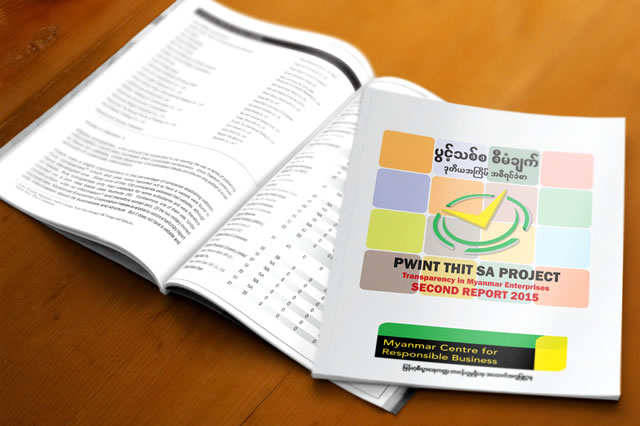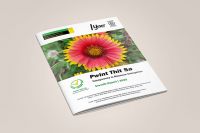Transparency in Myanmar Enterprises: the best get better, but what about the others?

The Myanmar Centre for Responsible Business (MCRB) has launched its second Transparency in Myanmar Enterprises (TiME)/Pwint Thit Sa report.
This study compares the websites of 100 of the largest Myanmar companies and scores them on what they say on their corporate governance and business practices, particularly concerning anti-corruption, organizational transparency, and human rights, health, safety and the environment (HSE). However it only scores what information companies publish, and is not an assessment of their actual performance. The aim of the report is to encourage increased transparency by Myanmar businesses.
The 2015 report shows that the top companies which performed best in 2014 continue to be the most transparent in 2015. All of them have increased the amount of information they make available to the public.
The most transparent large Myanmar company was Serge Pun and Associates (SPA) (9th in 2014), followed very closely by Max Myanmar (3rd in 2014), with KBZ (1st in 2014) coming in third place.
Amongst the leading companies, new areas of disclosure were publication of actual financial data including taxes, and environmental and social impact assessments.
However 39 of the 100 companies surveyed have no website, and score zero in the survey. Around 40 more companies who have group or subsidiary websites publish little or no corporate governance and sustainability information.
Vicky Bowman, Director of the Myanmar Centre for Responsible Business reported:
“Myanmar’s leading large companies continue to demonstrate a commitment to transparency and good corporate governance. They see it as fundamental to gaining and retaining their social licence to operate. We are also encouraged that some smaller companies have asked to be included in the Pwint Thit Sa project. They understand the business case for transparency, and the positive signal it sends to business partners, employees and wider society. Later this year, we will pilot a mini-Pwint Thit Sa, which will score any company that volunteers against the same ratings as for the main study of large companies”.
Noting that even where companies had websites, there was less information in the Burmese language than in English, Vicky Bowman noted:
“However it is disappointing that many large companies still have no websites, or only have marketing sites with little corporate governance information available on them. As mobile and internet use is accelerating in Myanmar, we encourage all companies to use this medium to disclose information to stakeholders, including journalists. Although there is not yet a regulatory requirement on large Myanmar companies to report non-financial information, voluntary disclosure will encourage better understanding of and trust in business. We also hope the local media and Myanmar civil society groups will study the public commitments that these companies do make, and hold them to account to deliver on them”.
Turning to companies involved in the natural resources sector, Vicky Bowman observed:
“Once again, a number of Myanmar companies in the oil and gas/services sector such as SMART, Parami, and Myanmar Petroleum Resources Limited (MPRL), are showing themselves to be transparency leaders amongst their Myanmar peers. However, this is not the case for mining companies, particularly those in jade mining and trading. With Myanmar now a candidate country for the Extractive Industries Transparency Initiative (EITI), now is the opportunity for Myanmar companies in that sector to voluntarily disclose more information to help fight the resource curse”.
This year for the first time, the report makes recommendations about increasing company transparency, which are not just directed at Myanmar companies, but also to the Government and the 2016 Parliament (particularly concerning the revisions to the Myanmar Companies Act and Myanmar Investment Law), institutional investors, civil society and the media.
The survey will be repeated in 2016. MCRB welcomes feedback on how it can be improved.
In the Media
Do we still need boycotts when you can send an angry tweet? - The Guardian, 30 July 2015
Background
-
Myanmar Centre for Responsible Business (MCRB) is a Yangon-based initiative funded by the UK, Denmark, Norway, Switzerland, the Netherlands and Ireland, based on a collaboration between the UK-based Institute for Human Rights and Business, and the Danish Institute for Human Rights. The Centre was established in 2013 to provide an effective and legitimate platform for the creation of knowledge, capacity and dialogue concerning responsible business in Myanmar, based on local needs and international standards, which results in more responsible business practices. It is a neutral platform working with businesses, civil society and government.
-
The companies for the research were drawn from the list of the 2013/2014 Fiscal Year Top 1000 commercial tax payers and Top 1000 income tax payers published by the Internal Revenue Department, together with some other prominent companies and sector leaders. The list of these companies is available on MCRB’s website.
-
A list of the 35 questions/issues which have been searched for on company websites is also available in the Annex of the report, together with a selection of recent critical media and CSO coverage of some of the featured companies.
-
Companies were informed of the study in March and sent draft findings of research on their websites in May. They were invited to comment or add further information to their websites. Information published on websites up until 30 June 2015 was taken into account.
-
The 2014 study is available here.
-
The study was inspired by Transparency International’s Transparency in Corporate Reporting study (© Transparency International. All Rights Reserved). This initiative assessed companies’ anti-corruption reporting practices; the way in which they organize company holdings such as subsidiaries and joint ventures; and the level of information they report about each country they operate in. The latest TI report was published in November 2014. For further information see www.transparency.org.
Read also
- 2022 Pwint Thit Sa / Transparency in Myanmar Enterprises
- uab Tops the 2020 Pwint Thit Sa / Transparency In Myanmar Enterprises Ranking
- 2020 Pwint Thit Sa / Transparency in Myanmar Enterprises
- Corporate Disclosure in Myanmar – Regulatory Requirements and Sustainability Leadership
- Disclosure of Company Information Leads to Better Business Reporting and a Better Investment Climate
 English
English မြန်မာ
မြန်မာ မြန်မာ (unicode)
မြန်မာ (unicode)











